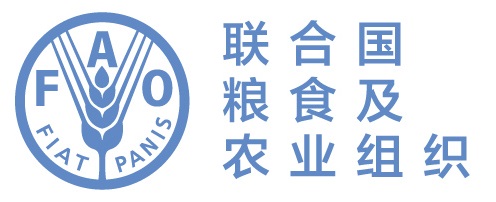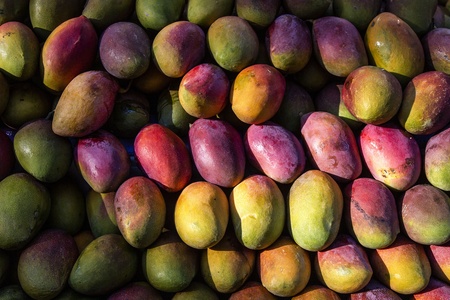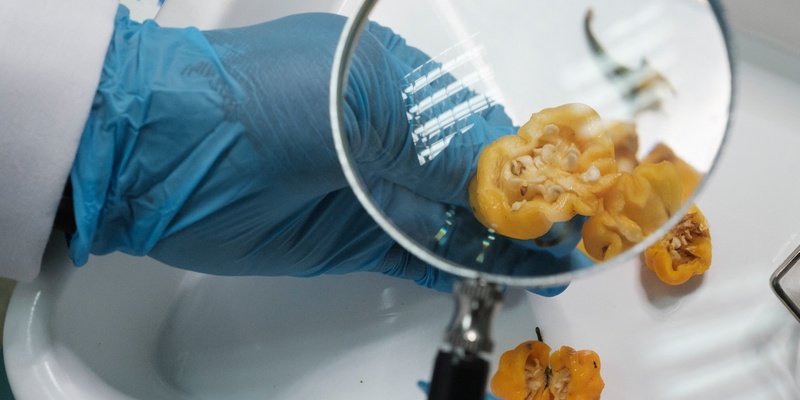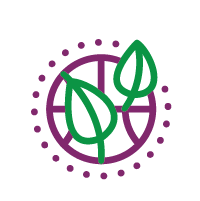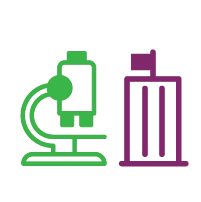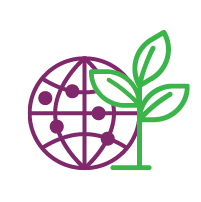什么是植物检疫能力评估(PCE)?
The PCE is a collaborative process that helps countries evaluate their phytosanitary capabilities. National stakeholders, including the national plant protection organization (NPPO) staff, reach a consensus on the main phytosanitary gaps at the system, organizational, and technical levels. Under a structured framework, the PCE process helps identify how to address these critical gaps based on strategic planning and logical framework methodologies.
The PCE:
- Is a self-evaluation process driven by the NPPOs, giving them flexibility and control. Usually, it involves internationally trained facilitators who serve as navigators and guide the NPPOs in conducting a thorough assessment. However, the country may decide to conduct the assessment independently;
- Is supported by an online system comprising 13 modules designed in a questionnaire-style format to document the evaluation process systematically. NPPOs can select modules based on their current priorities and needs;
- Once the gaps are identified, the NPPO can create a sovereign plan to address and rectify these issues by applying strategic planning tools such as cause and effects analysis, SWOT analysis, logical framework, and the final output, a phytosanitary capacity development strategy which is validated by stakeholders.
To find out more about the PCE process and how to start one in your country, read the next steps below or contact Sarah Brunel, IPPC Implementation Facilitation Lead, at
[email protected]
PCEs in practice: examples and case studies
 进行PCE有什么好处?
进行PCE有什么好处?
 谁驱动PCE流程?
谁驱动PCE流程?
The process is driven by staff of the NPPO but should involve non-NPPO representatives from appropriate government agencies, research institutes, universities, agro-industries or import/export associations, etc.
The presence of an IPPC-certified PCE Facilitator streamlines the process while ensuring coordination and neutrality. Furthermore, the Facilitator's participation in the workshops enables participants to get a clearer understanding of the questions, Result-Based Management tools and suggestions on the next steps to take. Finally, the Facilitator supports the NPPO staff and private stakeholders in navigating through the PCE platform and briefs the participants in a teaching/training methodology prior to starting the process.
"PCE Facilitators guide discussions towards productive conclusions while refraining from expressing personal opinions, ensuring NPPOs and stakeholders take full ownership of the process. Facilitators also contribute to preserving the quality and integrity of the evaluation methodology by explaining and teaching the methodology and overseeing procedural aspects of workshops. It's important to note that facilitators enhance the objectivity of the evaluation practice".
 What does the PCE consist of?
What does the PCE consist of?
The goal of the process is to reach a consensus and develop a structured plan involving the country's stakeholders that addresses weaknesses and enhances the country's capacity in plant health. The PCE process will end in a National Phytosanitary Capacity Development Strategy and new or revised legislation/regulation.
To develop a National Phytosanitary Capacity Development Strategy, the process involves three PCE missions and various stakeholders who work together to identify gaps using a structured questionnaire format during the first mission. During the second PCE mission, strategic planning tools are used to develop a tailored plan for each module. The third mission involves validating the PCE findings, including activities and estimated costs, and following up on the implementation of the strategy and resource mobilization.
When the country selects to work on a new or revised legislation/regulation (Module 2), the process begins with a thorough Situation Analysis to assess the current legal framework's strengths and weaknesses during a first legal mission. As decided by the NPPO, drafting and consultation follow, involving stakeholders' input and the creation of a draft of new or revised legislation/regulation that addresses identified gaps. This draft is then reviewed and validated, ensuring legal soundness and international alignment. Finally, the Follow-up phase focuses on adopting and implementing the new or revised legislation/regulation.
 How is the PCE process applied
How is the PCE process applied
The PCE tool is available to any country upon making an official request to the IPPC Secretariat. Once contact has been made, a facilitator has been chosen and a PCE team is in place:
1. First PCE mission: situation analysis
The first PCE mission is held in the country and lasts about one week. It identifies and invites available members of the PCE team and relevant stakeholders. The mission starts with a briefing with the PCE team, followed by an official opening which may be attended by ministers.
A consensus workshop is then held with all relevant stakeholders to fill in the selected PCE Modules online. For each module, a maximum of five weaknesses are identified. The first PCE mission might also include technical visits to the airports, ports, border points, diagnostic laboratories, production sites, etc. A brief about the mission is prepared and sent to the FAO permanent representative, the highest authorities in the country and any stakeholders the PCE team considers relevant. A report is prepared after each mission and submitted to the IPPC Secretariat, indicating results to date and next steps.
2. Second PCE mission: strategic planning
The second PCE mission brings together the PCE team and all relevant stakeholders to prepare a problem tree, do a SWOT analysis and develop a logical framework to address the weaknesses that were identified. They then begin drafting a national phytosanitary capacity development strategy. A workshop can be organized to discuss the revised phytosanitary legislation or regulations with all stakeholders.
Field visits may be organized, and interviews are conducted with selected stakeholders.
3. Third PCE mission: validation
During the third and last PCE mission, all stakeholders validate the national phytosanitary capacity development strategy, which may include a draft legislation/regulations. They officially present them to the FAO country office, high-level national authorities and donors.
At this stage, the PCE team and stakeholders have taken full ownership of the outputs of the PCE and of the process itself. They are fully empowered to present and defend their phytosanitary legislation, regulations and strategy.
 What are the modules about
What are the modules about
The PCE modules cover the System Level, which assesses the overarching phytosanitary framework and environment within a country; the Organization Level, which assesses the structures, processes, and resources of the NPPO; and the Core Activities, which assesses the specific phytosanitary functions and capabilities that are crucial for safeguarding plant health.
The number of modules is chosen by national stakeholders, and it reflects and depends on the country's needs. A minimum of 5 modules is recommended, excluding module 1 – country profile – being mandatory.
 |
System Level
1: Country profile
2: National phytosanitary legislation
3: Environmental forces assessment |
 |
Organization Level
4: NPPOs mission and strategy
5: NPPOs structure and processes
6: NPPOs resources |
 |
Core Activities
7: Pest diagnostic capacity
8: NPPO pest surveillance and pest reporting capacity
9: Pest eradication capacity
10: Phytosanitary import regulatory system
11: Pest risk analysis
12: Pest free areas, places and sites, low pest prevalence areas
13: Export certification, re-export, transit
|
 PCE流程需要多长时间?
PCE流程需要多长时间?
实施PCE的进度视国家的实际而定,通常为6个月至1年。IPPC秘书处建议,每3-4年开展一次完整的PCE。PCE可以整体或部分实施,也可以根据需要经常进行。
 Where has it been applied
Where has it been applied
The PCE has been applied across 4 continents, in over 120 countries since 1997 + map already existing to which we should add: Zimbabwe, Egypt and Uganda.
 PCE资金如何解决?
PCE资金如何解决?
IPPC秘书处付出极大努力一直在推进PCE并已在数十个国家中应用。一次完整的PCE流程, 需要平均8万美元(包括审查和起草初级的植物检疫立法)。
IPPC秘书处对PCE不提供资金 支持,但可与 捐资者 密切合作,并根据要求对应用PCE提供支持。各国家自行确定其内部或捐资方的资源。有些成员国能够独自为实施PCE提供资金,即从他们国家预算中列支。对其他的情况,捐资者可以向申请进行PCE的国家提供资助。
无论什么资金方式,各国都应分配出部分资源用于规划、确定利益攸关方和组织研讨会,支持完成PCE流程。
多数情况下,PCE是通过 粮农组织(FAO)技术合作计划(TCP)项目.申请。通常是捐资者要求完成PCE,例如来自“标准与贸易发展基金”(STDF)的赠款资金。
 为什么对PCE及其成果保密?
为什么对PCE及其成果保密?
由于以下原因,PCE模块和成果是保密的:
- PCE流程涉及政策、技术和管理层面的战略思考,并需要对以下方面的知识深入了解,包括植物健康、利益攸关方管理、植物检疫系统运作、IPPC文本和国际植物检疫框架等。如果PCE模块可以自由进入,在没有相应知识和没有PCE培训师在场的情况下,可能会发生不正确的操作。
- PCE模块收集的信息涉及国家植物检疫系统的综合数据,这些数据可能在经济、政治和技术方面敏感,国家可能不希望将其公布。
- 多年的经验表明,NPPOs要求对PCE模块保密,以防备贸易伙伴可能的行动。
因此,
IPPC不会对外分享PCE结果,除非某个国家希望其PCE结果对外使用或公布。
 Steps to start
Steps to start
An official letter of request to conduct a PCE should be sent by a high-level official (Minister of Agriculture or the head of the NPPO) through the IPPC Contact Point of the requesting country to the IPPC Secretary (with copy to Sarah Brunel: [email protected]) indicating that the country is fully committed to undertaking a PCE and has the available funds to do it. The PCE coordinators name and CV should be included. The following three modalities are available for conducting a PCE:
- Facilitated modality with the support of an IPPC-certified PCE
facilitator with technical guidance from the IPPC Secretariat.
- Facilitated modality with the support of an IPPC-certified PCE
facilitator but without IPPC Secretariat involvement.
- Independent modality, the NPPO takes all responsibilities.
The IPPC Secretariat will then contact the requesting country to discuss and determine the following:
- Whether the country wishes to recruit a certified PCE facilitator.
-
Should the requesting country wish to recruit a certified PCE facilitator, the IPPC Secretariat will ask the country to select the preferred certified PCE facilitators from the updated IPPC list, considering geographical proximity to limit travel costs and language requirement. The IPPC Secretariat will then contact the preferred certified PCE facilitators for their availability and revert to the requesting country with the outcome. The requesting country is responsible to liaise with the PCE facilitator and agree on contractual terms.
-
Whether the requesting country wishes to engage the IPPC Secretariat for support with the overall follow-up of the PCE process, in addition to the recruitment of a certified PCE facilitator. In this case, the country would still select the preferred certified PCE facilitator as detailed above, and the Secretariat would support remotely when needed.
- If not, the alternative is for countries to conduct a PCE independently, without the support of a PCE facilitator or the IPPC Secretariat.
 Terms and Conditions
Terms and Conditions
Access to the online PCE system is only granted to authorized individuals from countries that have undertaken or are currently undertaking a PCE after fulfilling the relevant FAO procedures. PCE system users will be asked to agree to the Terms and Conditions for Using the Online PCE System to access it.

![]() How is the PCE process applied
How is the PCE process applied
